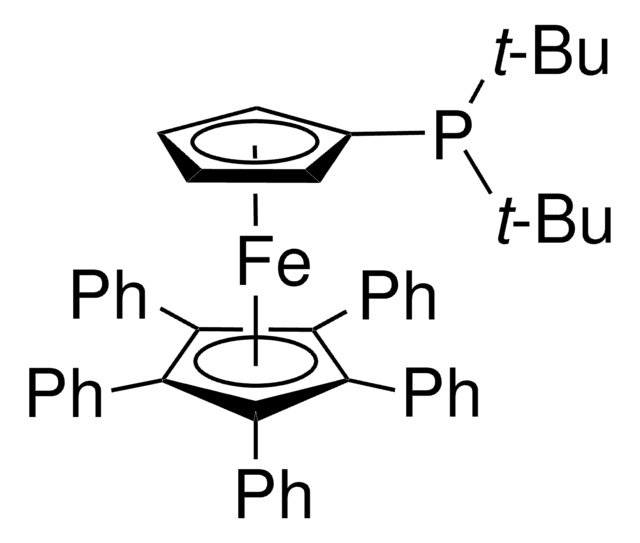672661
1-Phenyl-2-(di-tert.-butyl-phosphino)-1H-pyrrole
95%
Synonyme(s) :
cataCXium® PtB
About This Item
Produits recommandés
Pureté
95%
Capacité de réaction
reaction type: Asymmetric synthesis
Pertinence de la réaction
reagent type: ligand
reaction type: Buchwald-Hartwig Cross Coupling Reaction
reagent type: ligand
reaction type: Dehydrogenation
reagent type: ligand
reaction type: Suzuki-Miyaura Coupling
Groupe fonctionnel
phosphine
Chaîne SMILES
CC(C)(C)P(c1cccn1-c2ccccc2)C(C)(C)C
InChI
1S/C18H26NP/c1-17(2,3)20(18(4,5)6)16-13-10-14-19(16)15-11-8-7-9-12-15/h7-14H,1-6H3
Clé InChI
DVVDGSKDQGMLPW-UHFFFAOYSA-N
Description générale
Informations légales
Code de la classe de stockage
11 - Combustible Solids
Classe de danger pour l'eau (WGK)
WGK 3
Point d'éclair (°F)
Not applicable
Point d'éclair (°C)
Not applicable
Équipement de protection individuelle
Eyeshields, Gloves, type N95 (US)
Certificats d'analyse (COA)
Recherchez un Certificats d'analyse (COA) en saisissant le numéro de lot du produit. Les numéros de lot figurent sur l'étiquette du produit après les mots "Lot" ou "Batch".
Déjà en possession de ce produit ?
Retrouvez la documentation relative aux produits que vous avez récemment achetés dans la Bibliothèque de documents.
Les clients ont également consulté
Articles
cataCXium® ligands facilitate cross-coupling reactions, essential in polymer science, fine chemicals, and pharmaceutical industries.
cataCXium® ligands facilitate cross-coupling reactions, essential in polymer science, fine chemicals, and pharmaceutical industries.
cataCXium® ligands facilitate cross-coupling reactions, essential in polymer science, fine chemicals, and pharmaceutical industries.
cataCXium® ligands facilitate cross-coupling reactions, essential in polymer science, fine chemicals, and pharmaceutical industries.
Notre équipe de scientifiques dispose d'une expérience dans tous les secteurs de la recherche, notamment en sciences de la vie, science des matériaux, synthèse chimique, chromatographie, analyse et dans de nombreux autres domaines..
Contacter notre Service technique





![[Pd(OAc)2]3 reagent grade, 98%](/deepweb/assets/sigmaaldrich/product/structures/508/249/99a0ef2c-b77c-4d73-8ed9-0cca05b6b41f/640/99a0ef2c-b77c-4d73-8ed9-0cca05b6b41f.png)







